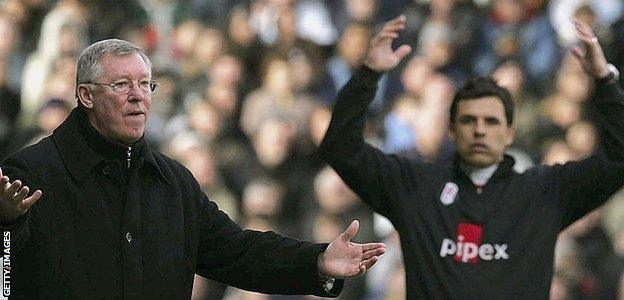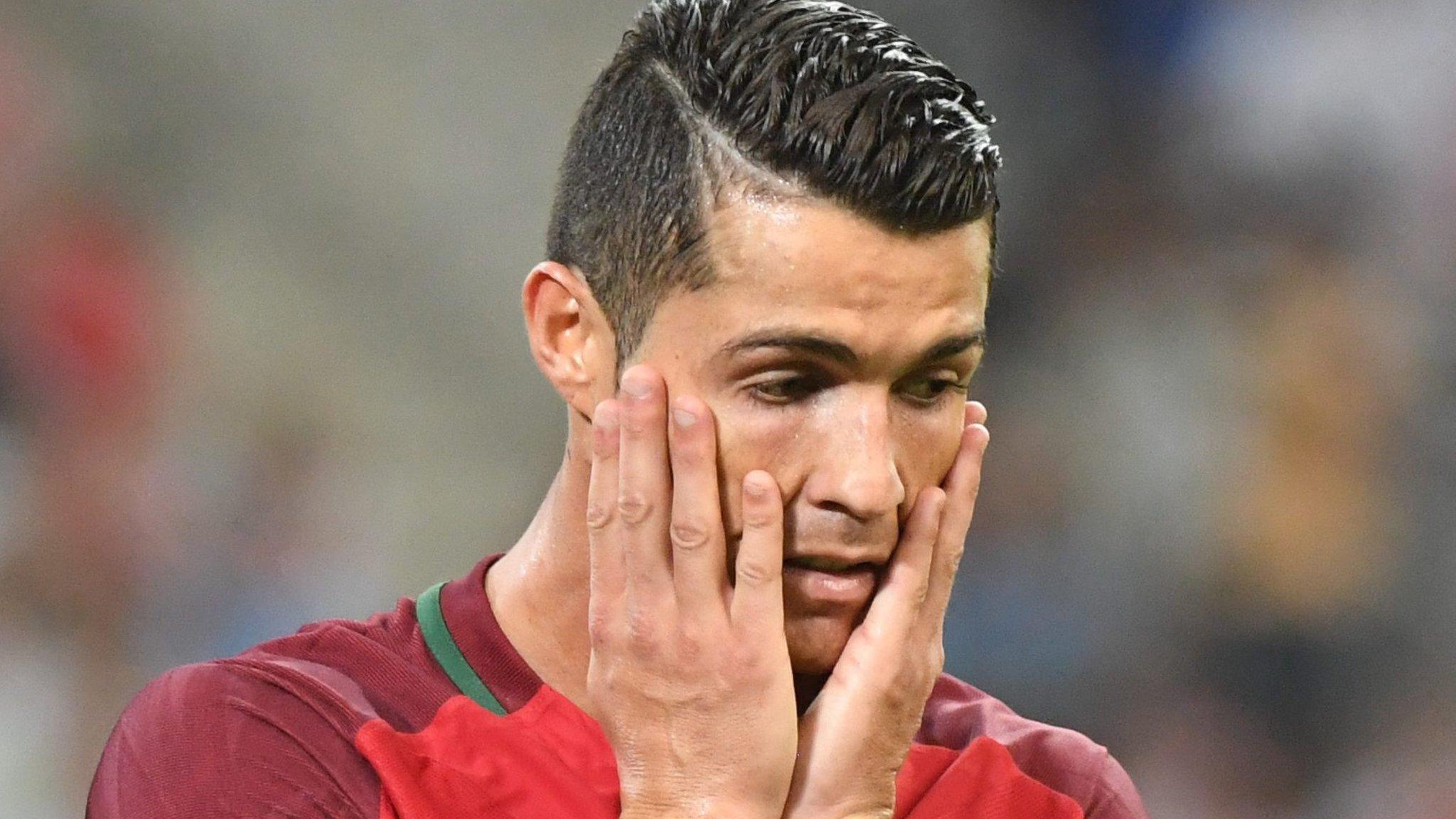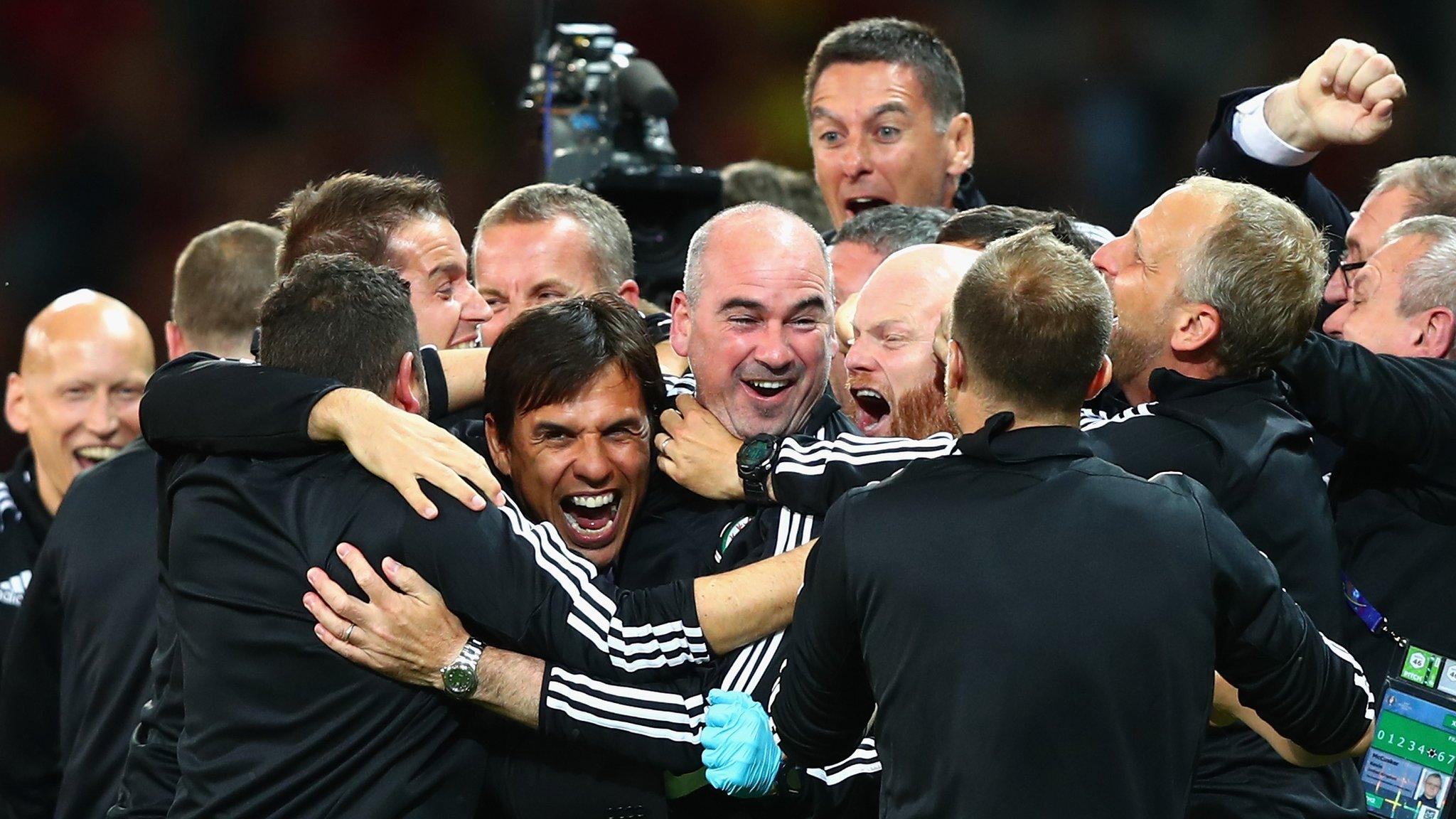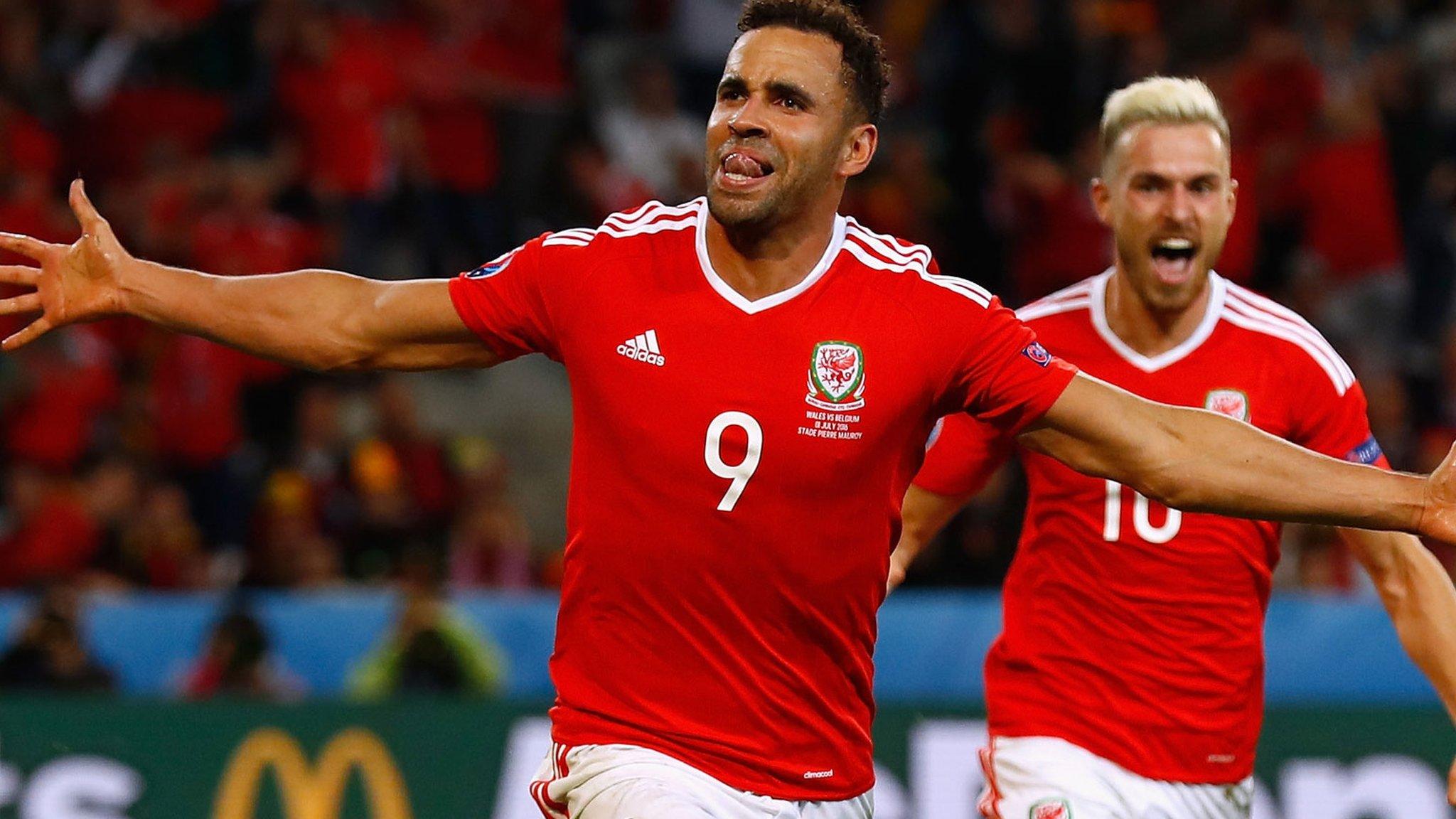Euro 2016: Wales boss Chris Coleman 'shaped by tough times'
- Published
The day before his team faced Portugal in the semi-final of Euro 2016, Wales manager Chris Coleman was asked if he would like to manage Belgium.
Portugal v Wales |
|---|
Date: Wednesday, 6 July Venue: Stade de Lyon, Lyon Kick-off: 20:00 BST |
Coverage: Live on BBC Radio 5 live, BBC Radio Wales, BBC Radio Cymru and text commentary online & on BBC Sport app |
Chris Coleman has masterminded Wales' greatest football achievement - and is on the brink of British football's finest moment for half a century.
Yet the manager describes himself as a man who has had "more failures than I've had success".
It was a typically candid comment, coming in the aftermath of the momentous 3-1 win over Belgium in the quarter-finals of Euro 2016.
Wales are now just 90 minutes away from the lucrative final of a major tournament for the first time.
Their journey into uncharted territory has been an uplifting tale, and the spirit of the adventure has resulted in Coleman's stock rising to an all-time high.
Yet his journey to this pinnacle has not been straightforward. This is a story of a man who has shown great resolve in the face of adversity - and is now reaping the benefits of always "daring to dream".
The crash
Coleman's playing career ended prematurely and in brutal circumstances, as injuries sustained in a car crash in January 2001 forced the then Wales and Fulham centre-back to retire.
Despite battling back to make a brief swansong appearance for Wales as a late substitute in the win over Germany in May 2002, Coleman had to confront the grim reality and announced his retirement five months later aged just 32.
"He is not one for talking a lot about his innermost feelings. But after that [the crash] he did write me a letter," says Kit Symons, Coleman's former centre-back partner for Fulham and Wales.
"It is probably the only time he wrote a letter to me and I have kept it to this day. I will not say what was in it and he probably won't thank me for mentioning it.
"But arguably the accident was the biggest event of his life along with the birth of his children and getting married. For someone who is always laughing and joking and taking the Mickey, it showed the magnitude of what happened."
Coleman's son Sonny, now 23 and working as an agent, was 10 when his father had his crash.
"He never let on how bad it was, larger-than-life character that he is," he says.
"I didn't even see a change in him, but he knew he would have to retire. He tore his Achilles tendon, broke his fibula and tibia, shattered his knees - basically all the worst injuries you could imagine for a footballer.
"Despite that, he was still himself, still laughing and joking. It was nice of [then Wales manager] Mark Hughes to give him those two minutes against Germany."
Coleman's final international appearance came as a substitute for a player making his first, Robert Earnshaw.
"That was a great thing to do. I always respect it when there's that respect for players who are retiring, giving them a chance to say goodbye," says Earnshaw, who scored the only goal in that memorable victory.
"I was making my debut so it was the beginning of my career and the end of his. It was a nice moment."
From Premier League to Greek second division
The silver lining of Coleman's early retirement was a fast-tracked route to top-flight management, succeeding Jean Tigana at Fulham in April 2003 to become the Premier League's youngest manager.
He impressed at Craven Cottage, guiding Fulham to four years of mid-table stability before a poor run of results led to his sacking in April 2007.
Coleman's next job was in Spain with Real Sociedad, fulfilling a long-standing ambition to manage abroad - but things did not go according to plan.
Coleman's managerial career |
|---|
May 2003: Takes over at Fulham at the age of 32, becoming the Premier League's youngest manager. He is sacked in April 2007 |
July 2007: Appointed boss of Spanish second division side Real Sociedad. Resigns in January 2008, citing issues with the club's new president |
February 2008: Appointed boss of League One Coventry. Sacked at end of 2009-10 season after Coventry finish 19th |
May 2011: Takes over as boss of Greek second division side Larissa but leaves in January 2012 blaming the financial problems at the club |
January 2012: Appointed Wales boss following the death of Gary Speed. Guides them to Euro 2016 |
Late for a news conference and untraceable on his mobile phone, when Coleman finally turned up an hour and a half later he told waiting journalists his washing machine had flooded his flat.
However, Spanish newspaper Marca published stories suggesting Coleman had been out partying until 5am and the former Wales defender eventually admitted doing so, before apologising for his "mistake".
"I have had to change quite a bit about myself and that is probably maturity as well," says Coleman.
"When I was 32 I'd look back to when I was 20 and think, 'Why did I do that; that was stupid' and, equally now, I look back to when I was 32, 33 or 34 and think, 'I can't believe I did that'."
With Sociedad just a point away from the automatic promotion places in Spain's second division, Coleman resigned, external - citing his untenable relationship with the club's president - and he returned to England with Coventry.
Former Coventry chairman Ray Ranson hired Coleman in 2008 but sacked him a little over two years later as the Sky Blues finished the 2009-10 season in 19th place in the Championship - their lowest league finish in more than 45 years.
"We had a good working relationship but in the end it didn't help the situation that we were financially hamstrung by the people I owned the club with. I think we were both let down in that sense," says Ranson.
"The players really liked him. Nobody at Coventry has a bad word to say against him. I do think international management suits him."
In an attempt to rebuild his reputation, Coleman took charge of Greek second division side Larissa - following a recommendation from Sir Alex Ferguson.

Sir Alex Ferguson (left) gave Coleman some management career tips
"He'd told me to take whatever came up, so I did," says Coleman.
"If you get it wrong, two jobs running getting it wrong it's hard to get a third one. That's generally the rule. I got it wrong at Coventry. I could give you sob stories but, if I'm honest, I should have done better.
"A year out was good, thinking about my approach in and outside the job. But it was still the second division in Greece. One of the best things I've ever done because you find out a lot about yourself out of a comfortable environment."
With Larissa's financial difficulties meaning Coleman went for long periods without being paid, he left again despite some encouraging results.
He secured the job of his dreams in January 2012, though it was in tragic circumstances as he succeeded Gary Speed as Wales manager following his close friend's death two months earlier.
"I'm here for a lot of right reasons and I'm here for a lot of wrong reasons, and that doesn't really sit right with me," Coleman said at the time.
"But of course I'm extremely proud to be leading my country. It's my proudest moment."
Nightmare of Novi Sad
The first few months of Coleman's reign were turbulent. After overseeing a friendly against Costa Rica in tribute to Speed, he lost his first four games in charge in earnest - the worst start by a Wales manager.
The most galling result was a 6-1 mauling by Serbia in Novi Sad, Wales' heaviest defeat for 16 years.
Coleman considered his future afterwards but Earnshaw, who was in Wales' squad that night, says the players were not aware of their manager's inner turmoil.
"There was emotion but no hinting it was too much for him," he says.
"It doesn't surprise me that he thought that, but when sometimes you can't see the end of the tunnel, it can be very, very difficult and dark."
Less than a year into his tenure, Coleman was already under intense pressure.
Victory against Scotland lifted some of the gloom and, although Wales failed in their attempts to qualify for the 2014 World Cup, finishing with a commendable draw in Belgium provided a glimmer of hope.
The start of Euro 2016 qualifying brought renewed optimism with a relatively kind draw and a promising group of players featuring Gareth Bale, Aaron Ramsey and Ashley Williams.
Wales delivered on their promise handsomely by securing their place at a major tournament for the first time since the 1958 World Cup.
Having overseen one of Wales' most humiliating results, Coleman had orchestrated one of their proudest moments.
The turnaround
Manager Chris Coleman believes Wales' success in the Euro 2016 championship is "not the end of the journey"
Wales' transformation under Coleman has been remarkable. Five months before he was appointed, Wales were ranked 117th in the world, their lowest position.
Four and a half years into his reign, Coleman is preparing Wales for a first semi-final in a major tournament.
"He had a difficult start but since he's put his own stamp on the team he's been absolutely incredible," says the talisman of the current side, Gareth Bale.
"He initially wanted to try and not change too much, too soon. Obviously results did not go the right way. He changed it and it has paid massive dividends."
The success has not changed him as a person to those closest to him.
"I've always seen him as a big character and he has always been my hero," says Sonny.
"He was 22 when I was born so, with the age gap quite small, we're best friends as well as father and son.
"He was a big influence and one of the reasons why I'm working in football now - the 'dark side' as my dad calls it!
"We have the same kind of interests, the same music taste. Johnny Cash was my grandfather's favourite. He sadly passed away two years ago, but he passed that on to my dad and he's passed it on to me.
"My dad likes the Rolling Stones, the Red Hot Chili Peppers and the Foo Fighters - and if Wales win, he'll always play 'Wonderwall' by Oasis."
The key to Coleman's - and Wales' - success is the absence of fear. There is no fear of failure. He and his players dare to dream.
And if they continue in the same vein against Portugal on Wednesday, there is a fair chance the Welsh changing room at Lyon's Parc Olympique Lyonnais will be shaking to the strains of 'Wonderwall'.
- Published6 July 2016

- Published5 July 2016

- Published6 July 2016

- Published5 July 2016

- Published5 July 2016

- Attribution
- Published5 July 2016
